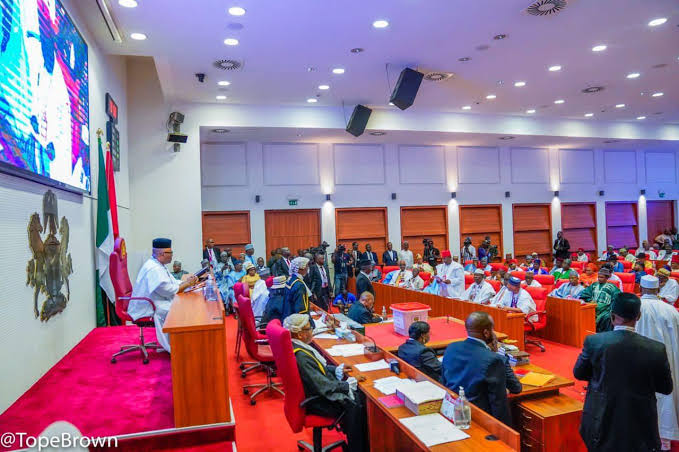The Senate leadership has strongly criticized Pastor Tunde Bakare over his recent comments concerning the National Assembly’s involvement in the political crisis in Rivers State and the suspension of Senator Natasha Akpoti-Uduaghan.
Bakare, who is the Serving Overseer of The Citadel Global Community Church, had decried both developments during a Sunday sermon, accusing Nigeria’s executive and legislative arms of undermining democratic principles.
“It is clear that our so-called leaders are determined to turn Nigeria into a mafia state,” Bakare declared.
“The two main contenders in the ongoing institutional immorality Olympics are the executive and the legislature.”
Reacting in a statement on Tuesday, Senator Yemi Adaramodu, who chairs the Senate Committee on Media and Public Affairs, dismissed the cleric’s comments as not only misleading but also damaging to the public perception of democratic governance.
“The attention of the Senate of the 10th National Assembly of the Federal Republic of Nigeria has been drawn to recent public remarks made by Pastor Tunde Bakare, which included sweeping generalisations and disparaging commentary aimed at the institution of the National Assembly,” the statement read.
“While the Senate respects the right of every citizen — regardless of station — to express views on the state of the nation, we are constrained to respond when such commentary crosses the line into unwarranted invective and misleading assertions that risk eroding public trust in democratic institutions,” he added.
Adaramodu acknowledged Bakare’s history of engaging in national issues but accused him of veering off the path of constructive criticism.
“Pastor Bakare, a cleric and political voice in his own right, has previously contributed to national discourse in ways that have spurred reflection and debate.
However, his most recent statements veer away from constructive criticism into rhetoric, unfortunately laced with contempt and unsubstantiated claims,” he said.
“We view his corrosive criticisms of the National Assembly as a biased and political ecumenical homily.”
He also noted that Bakare’s stature as a political figure and lawyer added weight to his comments and their potential consequences.
“While he remains a respected cleric, his role as a prominent political figure cannot be discounted when assessing the lens through which his comments are made,” Adaramodu said.
“His position as a political leader influences the context of his statements, which are not only reflections of personal views but also carry significant political implications.”
Highlighting Bakare’s legal background, Adaramodu added, “Pastor Bakare is not only a cleric and political figure but also one with a legal background.
He is, therefore, well aware of the constitutional boundaries that guide public commentary — particularly on matters that are sub judice.”
Reiterating the Senate’s commitment to judicial independence, Adaramodu stressed that the upper chamber would not make pronouncements on cases currently before the courts.
He also rejected suggestions for a more combative approach between the legislative and executive arms, describing such a posture as theatrical rather than effective.
“While some may attempt to portray an unnecessary adversarial dynamic between the National Assembly and the executive arm of government as a marker of virility in checks and balances, we must clarify that such tension, though it may entertain some, does not necessarily equate to effective legislative oversight,” he said.
“The true test of institutional maturity lies not in performative hostility but in principled engagements and results-driven processes.”
Responding to Bakare’s allusion to the “infamous third-term agenda” as a point of comparison, Adaramodu dismissed it as a misplaced critique.
“To cast aspersions on the entire institution based on personal frustrations, ideological differences, or as positioning ahead of possible future political alignments is not only unfair but also counterproductive to our collective democratic journey,” he said.
He concluded by noting that Bakare had also criticized previous assemblies in the past but, with time, had changed his stance.
“We are confident that, in time, with a nuanced review of the performance of the 10th National Assembly — within the context of the exigencies of this time and season — Pastor Bakare may, at some point in the future, commend us for acting in the best interest of the people of Nigeria, in line with our constitutional mandate.”
